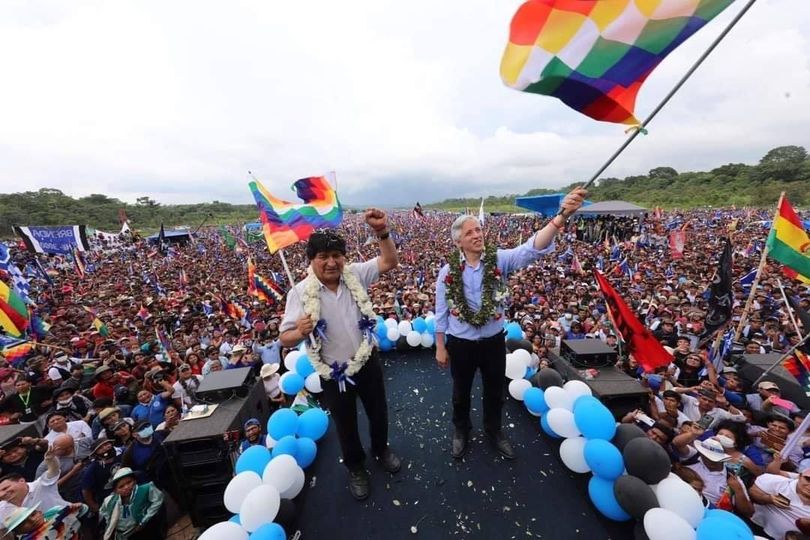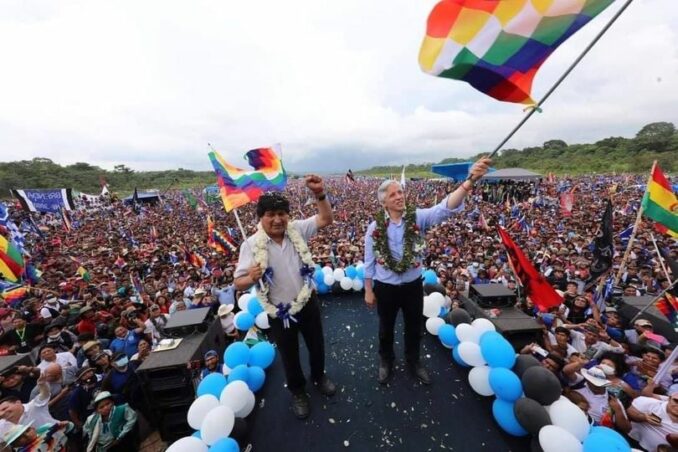

At Chimoré airport in Bolivia on Nov. 9, the people welcome former President Evo Morales and Vice President Alvaro Garcia Linera.
Nov. 16 — Evo Morales — president of Bolivia from 2006-19 before a U.S.-backed right-wing coup forced the first Indigenous president to leave both his office and his country — returned in triumph Nov. 9, as the workers and farmers of Bolivia dealt a blow to imperialist domination of their country and the continent.


At Chimoré airport in Bolivia on Nov. 9, the people welcome former President Evo Morales and Vice President Alvaro Garcia Linera.
On Nov. 8, the day before Morales returned, newly elected President Luis Arce and Vice President David Choquehuanca of the Movement Toward Socialism (MAS) were inaugurated. Now in office, the MAS candidates had won the long-delayed Oct. 18 election by a landslide — receiving 55% of the votes compared to 29% for the center-right Carlos Mesa and 14% for the neo-fascist Luis Fernando Camacho.
In the past year, the mass movement of Indigenous peoples, workers and peasants was able to retake the government and drive out the right wing. They did this even though the rightists had a near monopoly of arms and had control of the Bolivian state — the army and police — plus their own armed paramilitaries. (See Jan. 18 editorial in Workers World — workers.org/2020/01/45843/)
Hundreds of thousands of supporters greeted Morales and former Vice President Álvaro García Linera as their motorcade wound through some 700 miles over three days, starting at the Argentine border. On Nov. 11, the caravan reached Chimoré airport in the heart of the Chapare region, where Morales once organized coca growers.
The Bolivian people celebrate the return of former President Evo Morales at the Chimoré airport in the Chapare region, Nov. 9.
At just about the geographic center of Bolivia, the airport had been on a U.S. military base until 2006. The Morales government expelled the U.S. forces from this base.
A year ago the Bolivian oligarchy and right-wing parties used armed gangs — the equivalent of fascist thugs — with the tacit and sometimes open support of the police to challenge a much closer election than Morales nevertheless won. Marching from their base in the eastern part of Bolivia, the fascists attacked MAS officials and political leaders, sometimes burning their homes or beating them.
The general leading the national army, instead of defending the elected government, virtually ordered Morales to resign, which he did. Morales and García Linera left from Chimoré airport for Mexico, then went to Buenos Aires, Argentina.
At the time the Organization of American States, and of course all agencies of U.S. imperialism and U.S. corporate media, backed ousting Morales. Most charged the MAS with voting fraud and mismanagement of the government, without evidence.
Movement reverses coup
Police and soldiers carried out two massacres of mostly Indigenous people demonstrating in the towns of Sacaba and Senkata in the week after last year’s coup, killing 11 people in each town and wounding many more. Despite this and other repression, the popular movement continued defending itself and rebuilding its strength. By last spring and summer, the people fought the coup regime and held strikes in August to fix the election date for Oct. 18.
Throughout the year, the coup government barred Morales and García Linera from returning to Bolivia. The MAS nominated Arce and Choquehuanca, who ran with Morales’ political blessing and won. Besides winning the top posts, the MAS won 21 of the 36 seats in the Senate and 75 of the 130 seats in the Chamber of Deputies. A majority of representatives in both houses are women.
The de facto (coup) government led by the “interim” president, Jeanine Áñez, was not only repressive, and ferociously corrupt, but incompetent in managing the Bolivian economy amidst a pandemic. Much of its already weak popular support started vanishing soon after the coup. During the past year, the coup parties pillaged a declining economy and fought each other over the spoils.
According to a report by Argentine anti-imperialist journalist Marco Teruggi, who accompanied Morales’ caravan to Chimoré airport, the Bolivian rightists remain divided in three parts: Áñez and others in the coup government who fear being charged with political or other crimes for their role and have retreated to their strongholds; Carlos Mesa and his allies, who have taken on the role of legal opposition; and Camacho, based in Santa Cruz in the East, who is plotting the next coup. (See Teruggi’s Nov. 13 article at workers.org)
The Camacho forces held a demonstration in the capital on the eve of the inauguration, trying to stop it. The MAS had to defend its own ceremony. Fascist elements bombed a MAS office in the capital, La Paz, only days earlier.
As Teruggi wrote, “Requests to Jeanine Añez to suspend the inauguration went unanswered; the Supreme Court of Justice refused the demand for an audit of the vote, and the military ignored the call” to stop it by force. The rightists must have looked so weak that all the international observers validated the voting and the count. This included the OAS, which a year earlier had played a key role in ousting Morales.
Last year the U.S. government became one of the first to recognize the “interim” regime in November, after what was clearly an illegal grab for power. Washington’s earlier role in executing the coup was obvious.
Following Bolivia’s Oct. 18 election, U.S. Secretary of State Mike Pompeo called Arce on Nov. 4 and congratulated him for his victory. Since as of Nov. 15, Pompeo still supported Donald Trump’s illegal attempt to remain in office for a second term, his concession in Bolivia indicates how low the U.S. considers the chances of the Bolivian rightists.
People march in 2019 with the wiphala, the Indigenous flag, in Cochabamba, Bolivia, in opposition to the right-wing coup.
What next?
As the experience of the 2002 failed coup attempt in Venezuela against Hugo Chávez showed, when a mass movement reverses a reactionary coup, it can open a road to advance the revolution. The coup makers exposed themselves. There is widespread desire to purge or prosecute those who carried out crimes against the people.
Up till now, the overwhelming electoral victory has prevented reactionaries in the Bolivian army from intervening against the workers and oppressed communities. Yet the threat remains. The police and many military officers still have their ties to the oligarchy.
Under those conditions, any steps the Bolivian popular movements take to create their own defensive forces deserve support from the anti-imperialist movement inside the U.S.
The epic struggle of the Palestinian people against the full weight of U.S. imperialism and…
The following report comes from the Bronx Anti-War Coalition organizers on a protest held in…
In the Canadian federal elections held on April 28, the Liberals won with 169 seats…
The following is Part 2 of a talk given by the author to a meeting…
Boston Students, professors and workers are confronting the Trump administration’s fascist crackdown at universities across…
Philadelphia Within days of Swarthmore students reviving a pro-Palestinian encampment on April 30, police arrested…